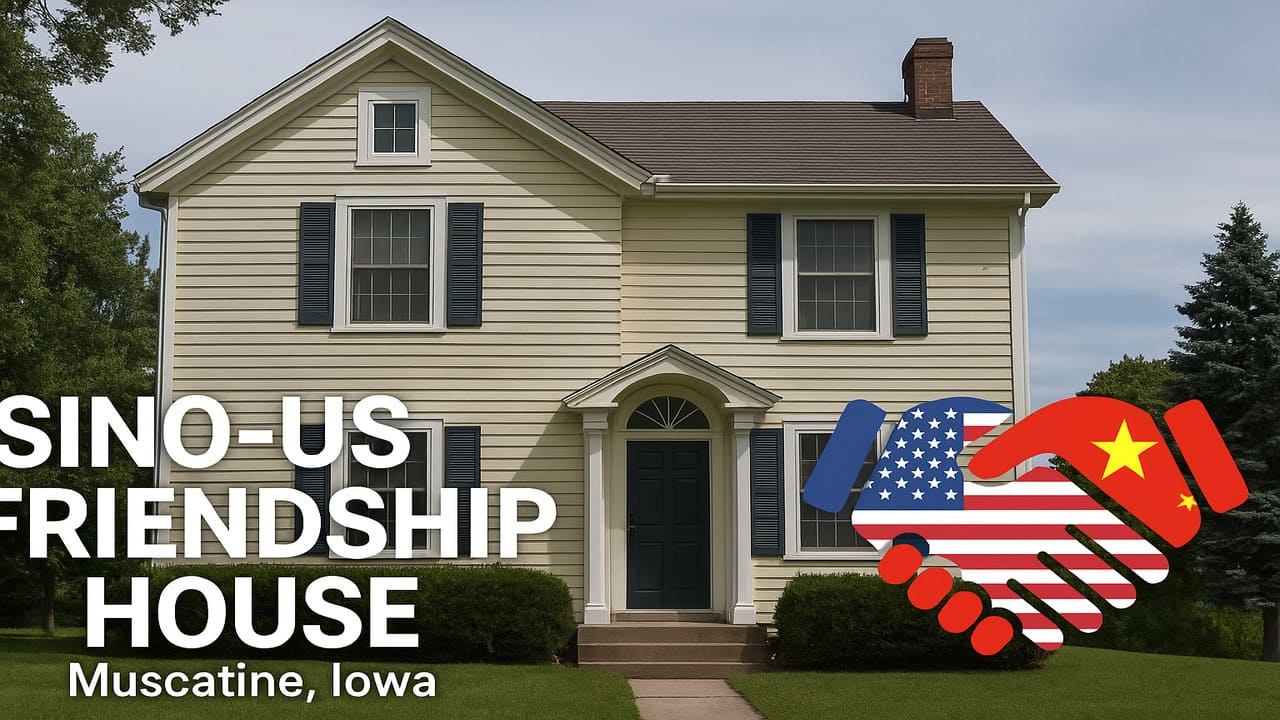
Meet Muscatine – The Sino-US Friendship House in Muscatine, Iowa, may look like a modest American home from the outside, but its history carries immense diplomatic weight. In 1985, a young county-level official from Hebei Province, China, traveled to Iowa as part of an agricultural delegation. His name was Xi Jinping, who decades later would rise to become the President of the People’s Republic of China.
Xi’s visit to Muscatine was not fill with pomp and ceremony. Instead, he stayed in the home of a local family, experiencing firsthand the warmth of Midwestern hospitality. This simple act of sharing space, meals, and conversations created a cultural connection that would echo decades later when Sino-American relations became one of the most important diplomatic dynamics in the world.
While Washington D.C. and Beijing are the usual backdrops for grand negotiations, Iowa holds a unique place in the story of China-U.S. relations. Known as America’s heartland, the state’s focus on agriculture resonates strongly with China’s own interest in food security and rural development. Xi Jinping’s visit as part of an agricultural study tour highlighted how shared concerns about farming and food production could serve as a bridge between two very different nations.
This rural connection proved surprisingly significant. Over time, Muscatine’s reputation as the town that once hosted China’s future leader transformed into a story of “people-to-people diplomacy.” The bonds built in this small Iowa community demonstrate how international relations are not only shape by treaties and summits but also by everyday encounters.
Recognizing its historical significance, the modest residence where Xi stayed was later renamed the Sino-US Friendship House. Efforts were made to preserve the property not just as a piece of local history, but as a living symbol of international goodwill. The house has since been renovated and opened to the public, allowing visitors to walk through the same rooms that once hosted Xi and his delegation.
Inside, the house features memorabilia, photographs, and exhibits that reflect both Chinese culture and Iowa’s Midwestern roots. Visitors can learn about the 1985 trip, view historical documents, and understand how this seemingly ordinary visit came to represent something far greater. By conserving the home, Muscatine has provided a physical space for reflection on the unexpected ways history is made.
Also Read : Muscatine Culture Uncovered: Traditions, Community, and Modern Living
The Sino-US Friendship House also functions as a cultural bridge. Beyond being a historical site, it has become a venue for hosting international delegations, educational programs, and cultural exchanges between Chinese and American communities. Students, academics, and diplomats have all walked through its doors to experience firsthand how one small town played a role in shaping global dialogue.
Local residents of Muscatine often describe their pride in being part of this unique story. For them, the house is more than a landmark; it represents the town’s place on the international stage. The ongoing exchanges remind visitors and locals alike that diplomacy is not just about politics—it is about friendships, shared meals, and personal connections that stand the test of time.
One of the most striking aspects of the Sino-US Friendship House is its humility. Unlike grand embassies or official state buildings, the home is modest and unpretentious. This simplicity underscores a deeper truth: meaningful diplomacy often begins with small gestures. By opening their home to foreign visitors, ordinary Muscatine residents showed a hospitality that would ripple outward into the highest levels of international relations.
This symbolic value continues today, as the house reminds visitors that personal relationships can influence global outcomes. In an era where political rhetoric often dominates headlines, the Friendship House serves as a gentle but powerful reminder that human connections remain central to peace and understanding.
Read More : HSR 3.6 Global Launch Dates Revealed, NA Gets It First & EU Asia Follow Hours Later
Instead of serving merely as a conclusion, the final topic turns to a broader phenomenon: the growing role of the Sino-US Friendship House in Muscatine’s tourism industry. The house attracts visitors from across the United States and abroad, particularly from China, where interest in Xi Jinping’s personal history remains strong.
For Muscatine, this has been an opportunity to showcase not only the house but also the charm of the community itself. Visitors come to explore the Mississippi River, enjoy local cuisine, and learn about the cultural landscape of Iowa. The Friendship House, therefore, has become a catalyst for economic and cultural exchange. What started as a modest act of hospitality nearly four decades ago now supports tourism, international awareness, and a reputation for Muscatine as a small town with a global story.
This Article About Sino-US Friendship House Written by: Ayu Azhari | Editor: Micheal Halim
Information Source: VisitMuscatine.com